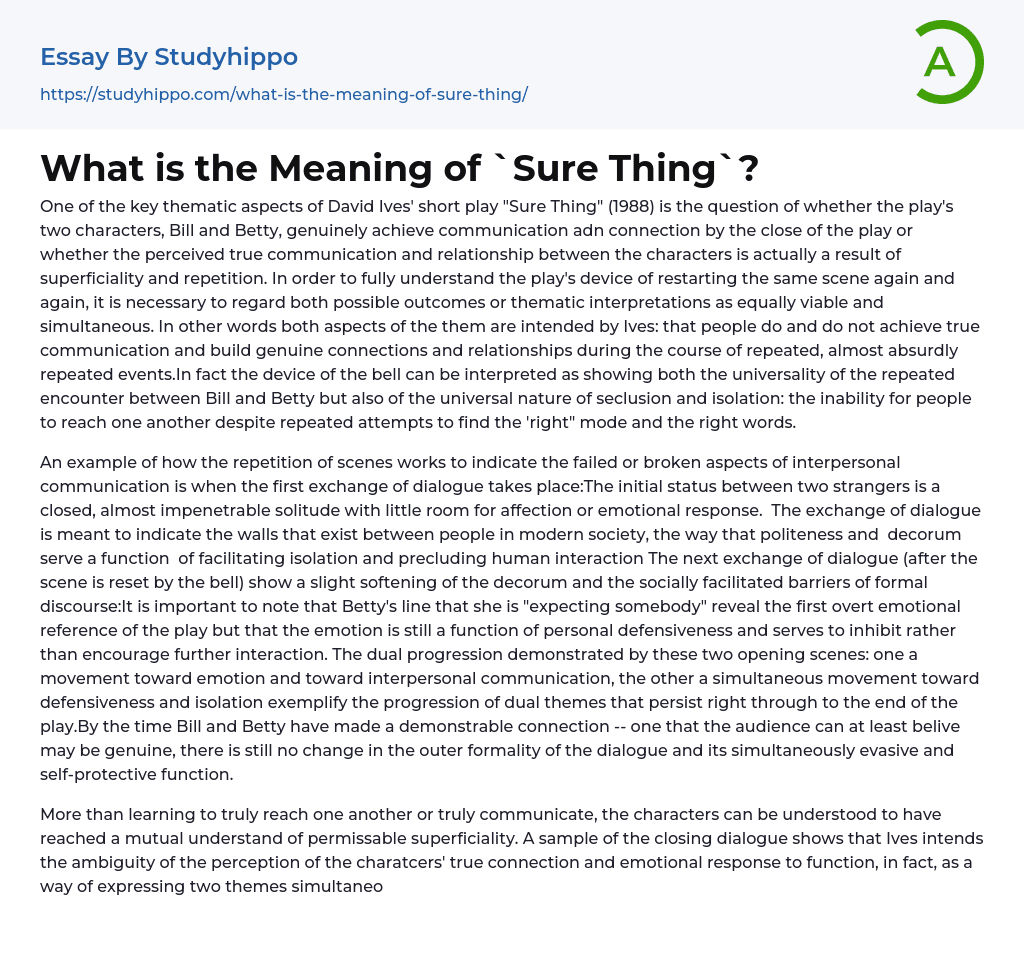One of the key thematic aspects of David Ives' short play "Sure Thing" (1988) is the question of whether the play's two characters, Bill and Betty, genuinely achieve communication adn connection by the close of the play or whether the perceived true communication and relationship between the characters is actually a result of superficiality and repetition. In order to fully understand the play's device of restarting the same scene again and again, it is necessary to regard both possible outcomes or thematic interpretations as equally viable and simultaneous. In other words both aspects of the them are intended by Ives: that people do and do not achieve true communication and build genuine connections and relationships during the course of repeated, almost absurdly repeated events.In fact the device of the bell can be interpreted as showing both the unive
...rsality of the repeated encounter between Bill and Betty but also of the universal nature of seclusion and isolation: the inability for people to reach one another despite repeated attempts to find the 'right" mode and the right words.
An example of how the repetition of scenes works to indicate the failed or broken aspects of interpersonal communication is when the first exchange of dialogue takes place:The initial status between two strangers is a closed, almost impenetrable solitude with little room for affection or emotional response. The exchange of dialogue is meant to indicate the walls that exist between people in modern society, the way that politeness and decorum serve a function of facilitating isolation and precluding human interaction The next exchange of dialogue (after the scene is reset by the bell) show a slight softening of th
decorum and the socially facilitated barriers of formal discourse:It is important to note that Betty's line that she is "expecting somebody" reveal the first overt emotional reference of the play but that the emotion is still a function of personal defensiveness and serves to inhibit rather than encourage further interaction. The dual progression demonstrated by these two opening scenes: one a movement toward emotion and toward interpersonal communication, the other a simultaneous movement toward defensiveness and isolation exemplify the progression of dual themes that persist right through to the end of the play.By the time Bill and Betty have made a demonstrable connection -- one that the audience can at least belive may be genuine, there is still no change in the outer formality of the dialogue and its simultaneously evasive and self-protective function.
More than learning to truly reach one another or truly communicate, the characters can be understood to have reached a mutual understand of permissable superficiality. A sample of the closing dialogue shows that Ives intends the ambiguity of the perception of the charatcers' true connection and emotional response to function, in fact, as a way of expressing two themes simultaneously which contradict one another but are nevertheless apparent throughout actual human society:In conclusion, Ives intended "Sure Thing" to express a dual theme: that human both incapable of reaching a state of true connection and communication but they are equally incapable of escaping the constant drive to seek just such a connection and relationship. In this way, the device of scene-repetition in the play is able to express to seemingly contradictory themes simultaneously in order to more fully represent the actual state
of human relationships in the modern world.
- Pressure essays
- Confidence essays
- Disgrace essays
- Lost essays
- Harmony essays
- Fairness essays
- Sarcasm essays
- Respect essays
- Responsibility essays
- Empathy essays
- Suffering essays
- Suspense essays
- Fear essays
- Feeling essays
- Loneliness essays
- Ambition essays
- Tolerance essays
- Hope essays
- Inspiration essays
- Kindness essays
- Shame essays
- Desire essays
- Doubt essays
- Grief essays
- Hate essays
- Laughter essays
- Passion essays
- Pride essays
- Forgiveness essays
- Happiness essays
- Humanity essays
- Loyalty essays
- Guilt essays
- Honesty essays
- Betrayal essays
- Need essays
- Boredom essays
- Courage essays
- Regret essays
- Anger essays
- Honor essays
- Honesty Is The Best Policy essays
- John Locke essays
- 9/11 essays
- A Good Teacher essays
- A Healthy Diet essays
- A Modest Proposal essays
- A&P essays
- Academic Achievement essays
- Achievement essays




